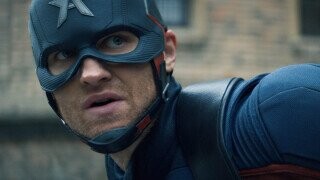Hear Us Out: 'The Falcon and the Winter Soldier' is Secretly About Iron Man

This week's episode of The Falcon and the Winter Soldier was bleak, violent, and unlikely to yield any hour-long videos of supervillains showing off their awkward dance moves. Most memorably, it ended with the new Captain America, John Walker, going full Goodfellas on a member of the Flag-Smashers following the death of his buddy Lemar Hoskins, AKA Battlestar.
There's obviously something going on here. The show is clearly using the Walker character as a means to examine the perils of nationalism through the lens of the Captain America gig. And as the personification of a country built on genocide, slavery, and structural inequalities, Walker's arguably a more suitable candidate for Captain America than anyone. But also, Walker, it could be argued, is a metaphorical stand-in for … Tony Stark.
Which sounds kind of crazy; Walker isn't a genius inventor, and he doesn't have the manicured goatee of a frontman for a Christian rock band in 1997. It's no secret that the franchise has posed more progressive questions of late, mostly in this show, presumably to melt the brains of 90% of America's YouTubers. But the MCU began by following the exploits of an elitist dick who was specifically likened to Elon Musk. Can you imagine if a new movie today tried to sell itself to audiences with the premise "What if Elon Musk had even more power?"
Don't Miss
It seems only natural, then, that The Falcon and the Winter Soldier, in its examination of superheroic supremacy and economic subjugation in the MCU, would have to reckon with the central fallacy that this more evolved Marvel show is the continuation of a story that followed the exploits of a literal billionaire -- i.e., part of the goddamn problem. The Falcon and the Winter Soldier is subtly demystifying Stark's legacy through Walker, whose "heroic" origin story goes back to his time in Afghanistan. Well, same for Iron Man …
Walker's Captain America is a government stooge? The Iron Man movies were partly funded by the U.S. Military in exchange for a "flattering" portrayal. And when we first see Walker in action, Battlestar is along for the ride -- a glaring example of the "Black sidekick," a regrettable Marvel trope that began cinematically with Iron Man and Rhodey and which critics have repeatedly called attention to. The most recent episode also specifically wrestled with the idea of power, in this case, the Super Soldier Serum, and how it affects people. Hoskins ominously opines that power "just makes a person more of themselves."

Marvel
And that proves to be the case with Walker, whose worst impulses are brought to the fore with deadly results. Again, this retroactively comments on the Tony Stark legend's wonkiness; a guy becomes a better person by achieving crazy powers, which seems somewhat incongruous with real-world history. And while Tony, to be fair, saves the world, many of his toxic flaws were often magnified too. His narcissism and recklessness lead him to make insane decisions like creating Ultron, not to mention abducting a minor and forcing him to engage in a superpowered gang fight. In a sane world, giving that guy the world's most powerful weapon would be a bad thing.
And Walker's climactic moment of ceding all control to violent rage wasn't dissimilar from Tony succumbing to feelings of vengeance at the end of Civil War. And Walker literally does the Iron Man pose in the process.

Marvel

Marvel
Obviously, this isn't a clear-cut one-to-one comparison, but if The Falcon and the Winter Soldier is making a concerted effort to steer the franchise away from the era of lionizing smarmy privilege, it makes a lot of sense to give us shades of Tony Stark in the antagonist. And metaphors are way cheaper than hiring Robert Downey Jr. to come back as a ghost or something.
You (yes, you) should follow JM on Twitter! And check out the podcast Rewatchability.
Top Image: Disney